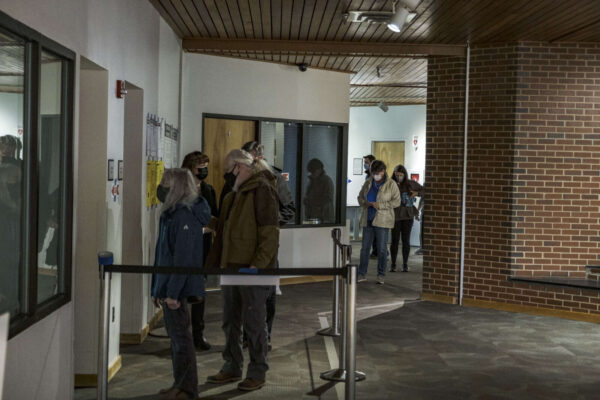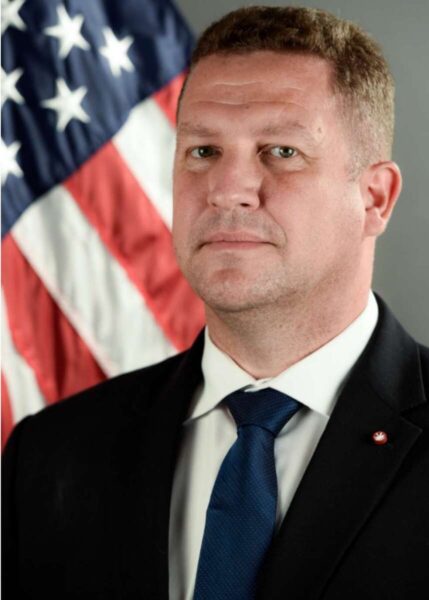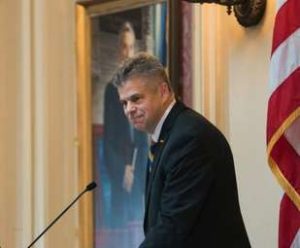This is an opinion column by Del. Ken Plum (D), who represents Reston in Virginia’s House of Delegates. It does not reflect the opinion of Reston Now.
Del. Ken Plum will head back to a very different Virginia State Capitol next month.
As the delegate for the 36th District, he says he’s looking to advocate for changes that Democrats heralded in during the last two years when they controlled both houses in the legislature and the governor’s office, a trifecta that hadn’t been since 1993.
“The election outcome represents a dramatic turnabout from the course we’ve been on the last two years, which has been one that has led to us passing some of the most progressive election laws in Virginia, election laws in the nation,” Plum told Reston Now. “I don’t want to see us turn back the clock on that.”
Virginia will become one of only three states in the country with split legislative control between Democrats and Republicans.
“Unfortunately, both parties in both Houses seem to insist on strict partisan voting, and that is really too bad,” he said. “It stands in the … ways which we could work together cooperatively and reach common solutions.”
With the results of the November election, Democrats will lose control of the House, meaning they’ll no long chair various agenda-setting committees, which for Plum was the Agriculture, Chesapeake and Natural Resources Committee.
In 2020, Plum advocated a proposal to create an urban agricultural advisory council to help support local sustainable food programs, but the bill lost steam in the Senate toward the end of the year. The proposed legislation is slated to expire in July 2023, and Plum says it’s something that he would like to revive.
With the upcoming session, which is slated to start Jan. 12, Plum says legislators hope to address issues with the state’s mental health system with a major study of the state’s Community Services Boards, which help people with mental illness, substance abuse, and developmental disabilities.
He said he would like to see more funding for the state’s CSBs, saying the state doesn’t need big mental health hospitals but needs growth with crisis intervention centers.
“That’s not a partisan issue. It’s a human rights issue. And we need to respond to it,” he said.
The 80-year-old legislator, who has represented the 36th District of half of his life, says he doesn’t want reforms to be rolled back, such as the end of the state’s use of the death penalty, a change he thinks will remain. He also highlighted other recent laws, such as the passing of legislation to help prevent racial and ethnic discrimination as well as discrimination of LGBTQ+ individuals.
In 2019, he sponsored a bill that became law regarding universal background checks for people buying guns, strengthening a Virginia law that was in place since 1989. Plum said he’s seen no evidence that it infringes on people’s civil rights, and he said he expects it to remain.
Meanwhile, the Virginia Supreme Court is working to redraw state and federal districting maps after a bipartisan redistricting commission failed to reach a plan by deadline, drawing criticism for partisanship by onlookers including Fairfax County Chairman Supervisors Jeff McKay.
Democrats continued to hold onto their trifecta of power in local races for the Virginia House of Delegates.
With 12 of 17 reporting, Democrat Ken Plum retained a stronghold over challenger Matt Lang, a Republican veteran, retaining nearly 72 percent of the vote for the 36th District. Lang secured a little over a quarter of the total vote.
Plum has served as House Delegate for the 36th District since 1982. He turns 80 the day after the election.
Democratic candidate Irene Shin — who knocked off incumbent Ibraheem Samirah in the June Democratic primary — also had a dominant lead over her Republican opponent, Julie Perry for the 86th district seat.
Shin clenched 66 percent of the vote while Perry had just 33 percent of the vote as of around 9 p.m. today. Just two of the county’s 13 precincts remain open.
Perry is a public school history teacher while Shin is the executive director of a nonprofit organization on civic engagement. The seat covers Herndon, Oak Hill, and Chantilly and some parts of Loudoun County.
Plum handily defeated a primary challenge with more than 77 percent of the vote in June.
After an otherwise uneventful day, the county’s Office of Elections had to rescan 20,000 in-person early voting ballots. Spokesperson Brian Worthy said there was “corrupted electric media” where votes were recorded in the machine used at early voting sites. The issue affected four of 38 machines.
Roughly 66 percent of Fairfax County voters voted for Democrat Terry McAuliffe — cementing its historically blue history. But Republican Glenn Youngkin appears to be inching ahead, with around 55 percent of the vote across the state.
The county’s elections office reported a turnout of 49 percent overall. But that number is expected to rise, as it did not account for three hours of voting.
All 100 House of Delegates seats were on today’s ballots. Currently, Democrats have a majority with 55 members to 45 Republicans.
This story was updated at 10 p.m. Angela Woolsey contributed to this report.
With early voting starting later this week, incumbent Ken Plum is facing off against his first Republican challenger, Matt Lang, in a decade for the delegate seat in the 36th District.
“A fresh set of eyes…and a different set of experiences,” Lang tells Reston Now about what he would bring if elected as the representative for the 36th District, which encompasses Reston to Leesburg Pike in Great Falls to Flint Hill Road in Vienna.
He also noted that he “wasn’t exactly comfortable” with much of the legislation being passed by the General Assembly recently.
“We’ve had a lot of people who have been in the same position for a long time… and I figured, ‘why not?,” he says about why he was challenging the long-time incumbent. “Someone needs to stand up.”
Lang announced his candidacy back in January, making him the first Republican to vie for the seat since Hugh Cannon in 2011. Cannon earned only about 36% of the vote and was easily defeated by Plum.
Plum says he believes he’s being challenged this year, both during the primary and the general election, because there’s a perception that he might be retiring soon.
“My suspicion is that there’s a thought in people’s minds that one of these days, I’m actually going to hang it up,” Plum tells Reston Now. “But I will tell you, I have no such plans currently.”
79-year-old Plum (he turns 80 the day after the election) has served as House Delegate for the 36th District since 1982. He’s the longest-serving member in the Virginia House of Delegates. In June, he handily defeated a primary challenge with more than 77% of the vote.
Plum reiterates that he’s not a status quo candidate, but someone that’s made a career vouching for change.
“I think people who review my record realize that I’m a change agent,” he says.
As examples, he cites his work and chairing committees that are pushing to clean up the Chesapeake Bay, reduce greenhouse emissions in the state, requiring universal background check for gun purchases, expanding voting rights, and abolishing the death penalty.
Plum also notes that while the Virginia Clean Economy Act was a huge step forward when signed into law in April 2020, amendments are already needed to broaden energy efficient programs and hasten the move to electric transportation.
If elected, that will be a major priority of his, he says.
“We’ve seen the most progressive legislation ever in Virginia’s history,” Plum says. “Passing laws that are most beneficial to all citizens.”
Lang says he felt compelled to run during the General Assembly’s 2020 special session, when he says a number of bills were passed “haphazardly and rushed,” particularly around law enforcement.
He is former law enforcement himself; he’s a Marine Corps veteran, once worked in the Fairfax County sheriff’s office, and now a security consultant.
“I looked at a lot of the people who work in the [House of Delegates] and realized a lot of these people are making decisions on things they don’t have a lot of experience in,” says Lang. “And I just don’t agree with that.”
He particularly noted the Senate Bill 5032, which eliminates a minimum term of confinement for those charged with simple assault on a law enforcement officer (as well as judges, others). However, that bill more or less died in the House.
Lang believes that lawmakers are not taking input from those who “are doing the job every day” and are losing the support of police officers due to that. This includes Plum, he says, who is on the Public Safety Committee.
“[Officers] are upset with the fact that they are not able to do their jobs the way they used to be,” he says about his conversations with law enforcement officers. “It’s not because they don’t want to do the job, it’s the fear that extreme oversight infers in the performance of their work.”
Both candidates understand that schools are going to be on top of voters’ minds this election, no matter if they vote on Friday or November 2.
Earlier this year, both chambers of the Virginia General Assembly passed a law that mandated in-person schooling for the upcoming school year. However, Fairfax County Public Schools (FCPS) have had a host of challenges since school started a few weeks ago. Now, virtual options are seemingly back on the table.
“Our first priority is to keep schools open for [in-person] learning,” says Plum. “But we need to follow the medical experts about how you do that.” He admits that could mean returning to virtual for a period of time.
Lang, whose own children attend FCPS, says it’s been “a quilt work of policies” and believes it’s important for children to remain in-person at school. He doesn’t think FCPS should be going back to a virtual option.
He’s also not in favor of vaccine mandates, like the one instituted late last month for all FCPS student-athletes. He is vaccinated himself, though, and encourages all to get it if they want to.
“I don’t think that it’s fair to force people to get the vaccine,” he says. “There are a myriad of reasons, [could be] a personal choice, could be health-related, could be religious exemptions, you name it.”
When asked why voters should check his name at the ballot box, Plum says because he brings experience, know-how, and understanding to the table.
“I am a known quantity and have been around a long time,” he says. “I believe the values I possess are the values of this district.”
He also noted that he supports Democratic candidate Terry McAuliffe for governor.
Lang supports the Republican candidate Glenn Youngkin, but says he’d reach across the aisle if elected.
“Politicians used to work across the aisle routinely, but in the past, 15, 20 years, it’s become less and less common,” he says.”And that’s a shame.”
He insists that he will always make himself available, listen to everybody, and consider their positions.
“It’s like your family. If you have a large family, you’re not going to get along with everybody,” Lang says. “You have to come to some kind of compromise… otherwise, your family holidays are going to be chaos.”
Early voting starts in Virginia this Friday, September 17, and will continue until election day November 2.
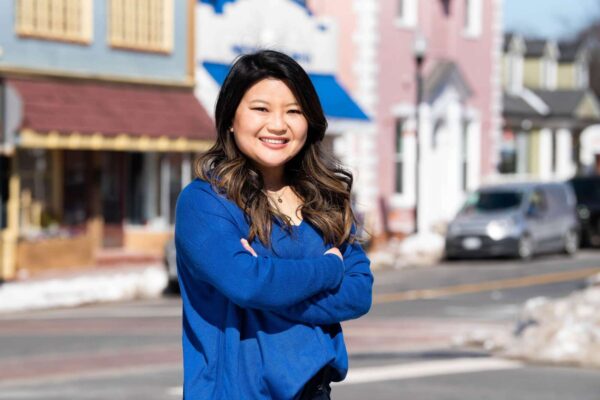
Sen. Janet Howell (D-Reston) has endorsed Irene Shin to represent the 86th District in Virginia’s House of Delegates, Shin’s campaign announced yesterday (Monday).
Executive director of the nonprofit Virginia Civic Engagement Table, Shin announced on Feb. 9 that she would campaign for the 86th District seat currently occupied by Del. Ibraheem Samirah, who is seeking his first full term after winning a special election in February 2019.
The 86th District include the Town of Herndon as well as portions of Fairfax and Loudoun counties.
“When I look for leadership in elected office, I look for approachable, community-focused leaders who listen to people first and work to deliver solutions in state government,” Howell said in a statement. “Irene Shin is the epitome of this kind of leadership. Irene will bring effective, pragmatic leadership back to the 86th District, and will represent the Democratic values that we all support.”
According to her campaign website, Shin is the daughter of Korean immigrants and a resident of downtown Herndon. Her political experience primarily comes from work as a community organizer for campaigns, nonprofits, and startups.
In addition to working for VCET, which supports and trains progressive nonprofits and activists, Shin currently serves on the board of the Competitive Commonwealth Fund, which helps recruit and raise funds for Democratic candidates in Virginia.
When she announced her candidacy in February, Shin said that she was inspired to run for office after watching Vice President Kamala Harris get sworn in on Jan. 20 as the first female vice president in U.S. history. According to her LinkedIn profile, she worked on Harris’s Senate campaign in 2015 as a finance director.
“My top priorities as a candidate for the House of Delegates are ending the pandemic and rebuilding Virginia back to be a better, fairer society, finally bringing access to Universal Pre-K for all families, and refocusing the office of delegate on community-based collaborative leadership,” Shin said in a statement to Reston Now.
Shin says she is proud to get Howell’s support, along with endorsements from current Herndon Mayor Sheila Olem and former mayors Lisa Merkel and Mike O’Reilly.
Samirah’s endorsements so far include Herndon Vice Mayor Cesar del Aguila and Councilmembers Naila Alam, Pradip Dhakal, and Jasbinder Singh. He is also backed by Hunter Mill District School Board Representative Melanie Meren.
On his campaign website, Samirah says that he sees “improving public health as the central issue that touches all others,” but he also highlights housing affordability, gun safety, and criminal justice, among other topics.
Shin and Samirah will face off in the Democratic primary on June 8. The ballot will also feature a battle for the 36th House District between incumbent Del. Ken Plum (D-Reston) and challenger Mary Barthelson, along with statewide races for governor, lieutenant governor, and attorney general.
Early voting for the primary will begin on April 23 at the Fairfax County Government Center. The first mail ballots will also be sent out that day.
Fairfax County will not have a Republican primary this June. The state party opted instead to select its nominees through a convention with remote voting.
Photo courtesy Irene Shin
Matt Lang, a veteran and security consultant who lives in Reston, is the first Republican candidate to challenge Del. Ken Plum (D-36) for his seat in the state House in a decade.
Lang, 45, will face the Democratic primary election winner in the general election. The Democratic primary is a faceoff of Mary Barthelson, 27, against incumbent Del. Ken Plum. Plum has been in this office since 1982 and also held the seat from 1978-80. The last Republican challenger for HD 36 was Hugh Cannon in 2011.
“I think a lot of people believe that Northern Virginia is one of those places where it’s going to be a Democratic or blue area the rest of eternity,” Lang said. “I don’t feel that’s 100 percent true. I feel there’s a lot of people out here with conservative values and Republican-minded thinking that just aren’t being listened to. I believe that’s a shame. I want to reach out to them, but I also want to reach out to everybody as well.”
Lang has lived in Reston for the last four years and has resided in Fairfax County since 1998 after being honorably discharged from the Marine Corps. The husband and father of three retired from the Navy Reserve at the beginning of this year after 22 total years of military service.
His military service and experience with law enforcement drives one of the primary issues he vows to take on if elected.
Lang acknowledges the “evolving field and practice” of law enforcement and the reality it will always change. However, he believes there are alternatives to calls to reallocate funds or defund police.
“I would like to see a more professionalization of the police. More training. More opportunities for them. Better recruitment,” Lang said. “We need to make the field something people want to work in and are compensated for doing such. Just like any other job, if you want quality, you pay.”
Among the issues Lang is bringing to the forefront is providing greater support to military veterans. Specifically, he cites his personal experience of getting out of active duty at 22 and being confronted with a lack of resources available to individuals like him.
“Not every veteran who goes into the military comes out with a marketable skill upon discharge. Some do, some don’t,” Lang said.
“I’d like to find some better programs, develop some policies and programs to get these guys transitioning out of the military better marketable skills, apprenticeship programs, recruitment into different businesses, especially within the state.”
A third issue Lang hopes to address is providing greater educational opportunities and advocating for additional benefits and pay for teachers and support staff.
He feels that parents don’t have enough say in their children’s education and is proposing an alternative option of providing a school choice or voucher system.
“I’d like to be able see us have a little more say in how our kids are educated,” Lang said. “I’d like to see a little more school-choice, voucher system put into play. Almost every other state in the country does such. Virginia is one the last ones lagging behind, and I think it’s time for us to catch up.”
He hopes to “find common ground” and opportunities to reach across the aisle to find solutions.
If elected, Lang said the first thing he will do is reach out across the aisle to try and come to a general consensus to pull people together.
“First thing I’m going to do is bring a little of the civility back,” Lang said. “I’ve seen too many delegates get down to Richmond and the first thing they do is come right out of the gate like a raging bull, changing things overnight. Just like a pendulum, you swing it too far to the left or right, it’s going to swing back the other way, it’s going to knock a lot of things out of the way.”
Photo courtesy Matt Lang
For the first time in over two decades, Del. Ken Plum, the state delegate for district 36, has a primary challenger.
Mary Barthelson, 27, is set to challenge incumbent Plum, 79, in the Democratic primary election. Plum, who has been in this office since 1982 and also held the seat from 1978-80, has run unopposed for the seat since 2011 when he faced Republican Hugh Cannon in the general election. The primary winner of the Barthelson-Plum race will face Republican Matthew Lang in the general election.
Barthelson officially announced her candidacy today.
Previously a data analyst, the Northern Virginia native currently works as a security engineer. Barthelson aims to use her engineering background to meet “a growing challenge” that is being presented by emerging technologies.
She grew up in Fairfax before attending Battlefield High School in Prince William County. She also earned a master’s degree from George Mason University in systems engineering.
“I think that my background makes me uniquely qualified to address the challenges that we’re currently facing, many of which are time sensitive both in technology and also with poverty that has risen as a result of the pandemic,” she said.
Technology and addressing poverty are her two primary focuses as she runs for office. She will also focus on green energy standards, creating green energy jobs and focusing on ending the state’s dependence on fossil fuels.
She believes that having an engineer’s eye will help to navigate challenges such as electric car standards and communicating them to legislators and the public to avoid similar issues.
“I think it lends itself to a new perspective in problem solving because people can get very fixated on the first solution that is proposed or the one that’s been proposed by someone they like instead of looking at all the information available from a wide range of sources to really come up with creative ideas to solve problems,” Barthelson said.
“That’s exactly what my background is in. Systems engineering is really the engineering of problem solving.”
Her agenda also includes reviewing and working on challenges presented with intellectual freedoms, doxxing, cyber flashing and data concerns.
Barthelson also vows to focus on removing barriers of entry into the workforce to help people from low-income backgrounds get jobs.
“I think technology is going to be a big challenge because a lot of these conversations are newer and we’re still navigating them and figuring out the best way to resolve problems and address them,” Barthelson said.
“Some of them are very complicated, so obviously it can take time to really work through that and figure out the best policies to solve the problem.”
Another technology aspect she wants to implement is making sure disinformation curriculum is provided to schools “so that the next generation has the tools it needs to engage in appropriate social media behaviors and use critical thinking when assessing information that they consume online.”
Barthelson said she decided to run because of the “time sensitive” issues she sees in poverty and challenges technology is now bringing. Among those issues is communicating with and ensuring money is properly distributed to small businesses that have closed as a result of the pandemic.
As the owner of PPE 4 NOVA, which she established to help Virginians access masks during the pandemic, she said many people with small businesses she spoke to were unaware of where to access resources available to them.
“I think we really need new ideas and we need the next generation to start getting civically engaged as well,” Barthelson said. “And with the pandemic and all the challenges that we’re facing right now, it’s really a time sensitive issue. So it’s something that we need to address now and not later.”
Photo courtesy Mary Barthelson
 This is an opinion column by Del. Ken Plum (D), who represents Reston in Virginia’s House of Delegates. It does not reflect the opinion of Reston Now.
This is an opinion column by Del. Ken Plum (D), who represents Reston in Virginia’s House of Delegates. It does not reflect the opinion of Reston Now.
A new bill introduced by VA Del. Ken Plum of the 36th District would repeal mandatory jail sentences for second and subsequent misdemeanor larceny convictions.
Under current Virginia law, anyone who is convicted of a second misdemeanor larceny conviction is subjected to a mandatory jail sentence of at least 30 days (but not more than 12 months). A third misdemeanor larceny conviction is a Class 6 felony, punishable with at least a year in jail.
Misdemeanor, or petit larceny, is defined as theft of items under $1,000. The law was first passed more than 50 years ago. The bill passed the Virginia House of Delegates by a 52 to 45 vote with three delegates not voting.
If approved, Plum’s bill would change the mandatory jail sentences. Plum is a Democrat and a long-time delegate for a district that covers a large portion of Reston. He has a weekly opinion column on Reston Now where he discussed this very topic.
The bill would not repeal all punishments for petit larceny, simply not make a jail sentence mandatory on second and subsequent convictions.
Plum says he believes the current law works against people of color.
“What we’ve come to recognize is that laws are not just in Virginia. They’re not always appropriate to the severity of a crime versus punishment,” he says. “It works to the disadvantage of those people of color… or those disadvantaged by income or social status.”
He cites statistics and explanations from Justice Forward Virginia, a political action committee advocating for criminal justice reform in Virginia, to justify why he’s introduced this bill.
“Incarcerating someone for 5 years for stealing something worth less than $,1000 is facially unreasonable,” reads their website. “Whatever value we may place on the security of someone’s property, imprisoning someone for five years for shoplifting doesn’t make sense.”
Justice Forward Virginia also notes that this law disproportionately impacts those most vulnerable. This could mean those who suffer from mental illness, substance use disorders, or are homeless.
Plum agrees with this assessment.
“There are a lot of people who steal things because they don’t have enough to eat. They don’t have the kind of family support that they need and their last is related to survival,” he says.
He says severe penalties like those in current Virginia law are simply piling on folks that can least afford it.
The repealing of the law could also save the Commonwealth money.
According to HB 2290’s fiscal impact statement, approximately 1,000 cases were impacted by this law in the fiscal years of 2019 and 2020. Of those, 792 were sentenced to a jail term.
Prisoners cost money but Plum says that was not a major factor in the bill’s consideration.
“We save a few bucks, but mainly what we do is we save lives of people who get caught up in the criminal justice system,” he says.
One of those voting against the bill is Delegate Mark Cole of the 88th District, which covers parts of Fauquier, Spotsylvania, and Strafford Counties.
In an email to Reston Now, Cole said he voted against the bill because it lessens the punishment for repeat offenders.
“If you are going to give someone a break, it should be a first offender that may be unlikely to re-offend, not a repeat offender,” he wrote.
The bill has been referred to the Virginia Senate Judiciary Committee.
Photo via David Clarke/Unsplash
 This is an opinion column by Del. Ken Plum (D), who represents Reston in Virginia’s House of Delegates. It does not reflect the opinion of Reston Now.
This is an opinion column by Del. Ken Plum (D), who represents Reston in Virginia’s House of Delegates. It does not reflect the opinion of Reston Now.
My mom and dad had little or no formal education which was not that unusual for children in large families growing up in rural Virginia in the 1920s. What they lacked in schooling they made up in basic values of honesty and hard work. Their ambition for their three sons of which I was the youngest was to finish school which for them meant high school. Mom’s advice to me for I had obvious interests in doing more than graduating high school and working a local job was captured in the words of the country music song of Earl Scruggs and later Ricky Skaggs, “Don’t Get Above Your Raisin.'”
Going off to college as the first in my family to do so was a frightening experience but one that soon became a labor of love. I could not learn enough about the world around me and most especially about history and politics. I was a product of a public school system in Virginia, and even as a youngster I knew that the story of the state was much more complex and involved than the glorification of its history presented in the state-approved textbooks. My love of learning led me to finish an undergraduate degree in history and political history at the then Old Dominion College. I went on to the University of Virginia where I received a master’s degree in teaching the social studies in 1967. That program had an internship experience that led to me being placed in Fairfax County Public Schools from which I retired thirty years later.
I refused to use the state-approved textbook on Virginia history in my classroom because of the distortions and misinformation it contained. My school administrator supported me, and a few years later I consulted with FCPS when it produced its own edition of a more-accurate Virginia history textbook. Also about the same time, I announced my candidacy for the House of Delegates and was elected on my third try. My interest was not to change school textbooks but to help alter the course of the state’s history to remedy the many wrongs of its past and to make it a state where all people had equal opportunity. I knew about the inequality of opportunity in the state by my volunteer work with the Community Action Agency.Setting aside challenges related to the pandemic and the craziness of the current federal administration, I feel a greater sense of hope for the Commonwealth than I believe I have ever had. I have written often about the transformative General Assembly session this year and the passage of much-needed legislation on fairness and equality that had been debated and never passed for years. This month the General Assembly will take another important step in reforming our criminal justice system.
As my friend and historian Bent Tarter wrote recently in a column “Black Lives and Confederate Monuments,” (www.virginiaforum.org) “We all have much to learn, or we will continue to repeat the sorry sequences of violence that exacerbate rather than solve problems. Learning, one of my college teachers explained, should involve a change in behavior.” As a native Virginian I sense that now more than ever we will at long last be seeing changes in behavior in the Commonwealth.
File photo
 This is an opinion column by Del. Ken Plum (D), who represents Reston in Virginia’s House of Delegates. It does not reflect the opinion of Reston Now.
This is an opinion column by Del. Ken Plum (D), who represents Reston in Virginia’s House of Delegates. It does not reflect the opinion of Reston Now.
Dazzling is the only word I could think of to describe the amazing work that is going on in the Virginia General Assembly this legislative session. The annual meeting of the legislature is just approaching half-time of its annual session, but already significant policy changes are being debated and adopted. There is little new to the policies that are being adopted; many are in place in other states already. But in Richmond they seem revolutionary!
I have already written about the ratification of the Equal Rights Amendment in the early days of the session. The movement to ratify the ERA began in the early 1970s but was not successful in Virginia until nearly 50 years later! Since two ratification deadlines have already passed, the fate of the amendment with Virginia being the needed 38th state to ratify is uncertain. Virginia Attorney General Mark Herring is among the leaders seeking a judicial decision to validate the amendment’s ratification. Although the Nineteenth Amendment granting women the right to vote was ratified in 1920 and added to the Constitution, Virginia did not add its support to ratification until 1952!
While legislation must be passed by both houses of the legislature and signed by the governor to become law, here is a run-down on what has been approved so far by at least one house. By the time the legislature adjourns in early March this legislation is expected to be approved by both houses and sent to the governor. Numerous bills have been passed to ban discrimination against persons because of their sex; bills to protect LGBTQ+ persons would not have made it out of committee last year. Bills to ban discrimination in housing, public accommodations, employment and credit applications have passed as has a bill to ban conversion therapy.
Likewise, bills to protect public safety from the misuse of guns that would never have made it out of committee previously have passed in both houses of the Assembly. My bill to require universal background checks has passed as well as bills granting localities the right to ban guns in public spaces, increasing the penalties for leaving guns unsecured around children, and requiring people to report lost or stolen guns within 24 hours. A “red flag” law that allows authorities to remove guns from individuals who have shown themselves to be a danger to themselves and to others has passed.
This week action is expected on bills that will open up the state to more solar and wind power and that will establish standards for the increased use of renewables in generating electricity. Plastic bags may be eliminated or taxed to reduce plastic pollution. I am sponsoring the Governor’s bill to advance the clean-up of the Chesapeake Bay that is getting some push-back from the farming community that would be affected by regulations to clean up stream run-off. Numerous bills have already passed to make it easier to register to vote and to vote on election day, including no-excuse absentee voting.
There is more to come. Tune in next week or follow the sessions on live-streaming at House Chamber Live Stream for more dazzling action!
File photo
 This is an opinion column by Del. Ken Plum (D), who represents Reston in Virginia’s House of Delegates. It does not reflect the opinion of Reston Now.
This is an opinion column by Del. Ken Plum (D), who represents Reston in Virginia’s House of Delegates. It does not reflect the opinion of Reston Now.
The House of Delegates broke all records for brevity last week when it adjourned 90 minutes after convening. It was not because the 100-member body had become so efficient that it got all its work done; to the contrary it demonstrated how dysfunctional the body has become over the last several decades.
Brought together at the call of the Governor as he is constitutionally authorized to do, the House and the State Senate were asked to enact legislation in response to the gun violence that takes the lives of more than 1,000 citizens of our state each year including the most recent tragic mass murders of a dozen people in a Virginia Beach municipal building. The Republican majorities in both houses instead chose, on a partisan vote, to adjourn the Special Session before legislation on gun safety could even be discussed. Tellingly, the Special Session is adjourned until November 18 which happens to also be past the date of the next election.
The charade of sending the eight bills the Governor had recommended, along with the two dozen or so others that had been introduced, to the Crime Commission for study is laughable. All these bills had been introduced before and defeated in small subcommittees. There is little more that can be said about these bills other than they become more popular with the public as gun violence increases. The bill I introduced on universal background checks has been thoroughly examined over many years and in public opinion has an approval rate among voters hovering around 90 percent.
The argument that there was not time to hear the bills doesn’t ring true when you consider that a regular session of the General Assembly earlier this year considered more than 2,500 bills and resolutions in about a month and a half. All the weaving and bobbing and flimsy excuses are intended to cover up that the House of Delegates and the State Senate under present leadership have become dysfunctional.
The rules under which the Special Session was to be conducted were kept from the members and the public until the session convened even though the leadership had known the date for weeks from the Governor’s call for the session. Even more the sinister plan to do nothing by adjourning both houses came as a surprise to everyone but the smallest number of members in the Republican leadership.
One of the biggest problems in the House with its organization and operation is that the Speaker serves not as Speaker of the House but as head of the Republican majority. As a result there is no neutral arbiter to convene and conduct the business of the House. When I talked with the Right Honourable John Bercow M.P. of the British House of Commons a couple of months ago he spoke of his role as a neutral person who ensures that the House operates fairly. There is no pretense in the Virginia House that the Speaker is anything other than head of the majority party and operates the House not in fairness or impartiality but to the advantage of the majority even if that majority is secured by only one or two votes.
The House is dysfunctional as it currently operates and needs reform in the role of the Speaker.
File photo
 This is an opinion column by Del. Ken Plum (D), who represents Reston in Virginia’s House of Delegates. It does not reflect the opinion of Reston Now.
This is an opinion column by Del. Ken Plum (D), who represents Reston in Virginia’s House of Delegates. It does not reflect the opinion of Reston Now.
The threats to our democratic-republican form of government are more numerous than weeks of this column could enumerate. While I will not mention the more obvious ones brought on by the current administration in Washington, I do want to focus on two that have come about in the recent past — one just last week. They impact all levels of government and come about not from the executive branch of government or the dysfunctional Congress but rather from the judicial branch and its highest level, the Supreme Court! While I have always viewed the Supreme Court as a safety backstop that would save our republic from harm by the Congress or the president, in recent years it is the Court that has become one of the real threats to democratic governance.
One of the biggest inhibitors of advancement on progressive issues in Virginia has been the unrestrained ability of the members of the party in power at the time of the decennial census to choose the voters they want to represent for the next decade by gerrymandering district boundaries. For some of us there has been a struggle to put in place a non-partisan method of drawing district lines. With the great organization OneVirginia2021’s efforts there has been real progress towards meeting that goal. A Constitutional amendment passed the last session of the General Assembly that would establish what is described as a non-partisan and transparent process for redistricting. It must pass the 2020 session without change in order to be sent to the voters in a referendum before becoming part of the state constitution.
In the meantime lawsuits were successful in federal courts to have the Virginia Congressional and House of Delegates districts redrawn to eliminate discrimination based on race. The Supreme Court refused to review the new House of Delegates districts drawn by a lower federal court on a technicality that the current members bringing the suit did not have standing.
Of great concern, however, is the Supreme Court decision last week saying in effect that federal courts do not have the power to redraw politically gerrymandered district lines. The outcome could be more devastating to a republican form of government as the dominant party would be left free to establish itself in power without a way to challenge it.
The Supreme Court has historically sidestepped cases in the past that would have brought them into resolving partisan redistricting. I am fearful that the Court’s decision will result in rampant gerrymandering of legislative districts creating unparalleled control of legislatures. This unfortunate decision by the Supreme Court may have been exceeded in its partisan implications only by Citizens United that many people feel may have been the Court’s greatest mistake by bringing uncontrolled corporate influence into elections.
As usual the checks, although extremely limited to these kinds of bad decisions, continue to be voting the very best people into elective office.
File photo
Updated at 3:25 p.m. — Deputy Minority Leader Mark Sickles was recently added to the event.
An upcoming Greater Reston Chamber of Commerce event plans to examine how the current political climate will likely impact businesses across the state.
The event next Wednesday (March 13) features House of Delegates Speaker Kirk Cox (R-66th District), Deputy Minority Leader Mark Sickles (D-43rd District) and Stephen Farnsworth, a political science professor at the University of Mary Washington.
Attendees can expect to learn about how Gov. Ralph Northam’s policies and a narrowly divided General Assembly may affect businesses for the next two years. Cox will provide insight into which passed bills will impact the business community.
The event will be held from 7:30-10 a.m. at the Hyatt Regency Reston (1800 Presidents Street). Online registration will close on Tuesday (March 12).
Image via @SpeakerCox/Twitter
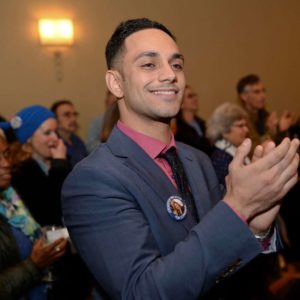 Democrat Ibraheem Samirah, a dentist from Herndon, was sworn into the Virginia House of Delegates this morning after winning the election for the 86th District Seat.
Democrat Ibraheem Samirah, a dentist from Herndon, was sworn into the Virginia House of Delegates this morning after winning the election for the 86th District Seat.
He joins Del. Sam Rasoul as the second Muslim — they are both Democrats — in Virginia’s General Assembly, according to a press release from his campaign.
Samirah, who is the son of Palestinian refugees, was separated from his father in middle school when his father was barred from re-entering the U.S.
The special election yesterday (Feb. 19) to fill now-State Sen. Jennifer Boysko’s former seat was the first time Virginia voters took to the polls after a series of scandals erupted in the state, starting with unearthed racist photos on Gov. Ralph Northam’s medical school yearbook.
The scandals continued with sexual assault allegations against Lt. Gov. Justin Fairfax and with Attorney General Mark Herring’s admission that he wore blackface. News reports revealed that Virginia Senate Majority Leader Tommy Norment (R-James City County) was a top editor of a yearbook that included photos of people in blackface and racial slurs.
Before the special election, Samirah faced attacks after a conservative website published two of his social media posts from five years ago, including one where he said sending money to Israel was worse than sending it to the Ku Klux Klan, according to news reports.
Samirah apologized for the posts, which he said were used in “a slander campaign questioning my views on Israel and my Jewish friends,” in a two-page statement posted on Facebook.
“I am so sorry that my ill-chosen words added to the pain of the Jewish community and I seek your understanding and compassion as I prove to you our common humanity,” the statement said.
Samirah was just shy of receiving 60 percent of the votes, according to unofficial results from Virginia’s Department of Elections.
Republican Gregg Nelson, a U.S. Air Force veteran, received 34 percent of the votes and Connie Haines Hutchinson, a former vice mayor of the Herndon Town Council who ran as an Independent, received almost 6 percent of the votes.
In total, 6,283 people voted in the special election.
Boysko took to Twitter to congratulate Samirah on his win.
Congratulations to @IbraheemSamirah on his resounding win tonight! @VAHouseDems #86th!
— Jennifer Boysko (@JenniferBoysko) February 20, 2019
Samirah ran a campaign focused on healthcare, transportation and education.
Now in office, Samirah is planning “to build on the 2018 Virginia Medicaid expansion and bringing healthcare costs down across the state by ensuring that the healthcare marketplace is competitive and accessible to all,” according to the press release.
Photos from the Virginia House Democrats on Twitter show Samirah being sworn in today.
Congrats to @IbraheemSamirah on being sworn into the @VaHouse this morning. pic.twitter.com/9sBk6mmPbt
— VA House Democrats (@VAHouseDems) February 20, 2019
Photo via Samirah for Delegate/Facebook



